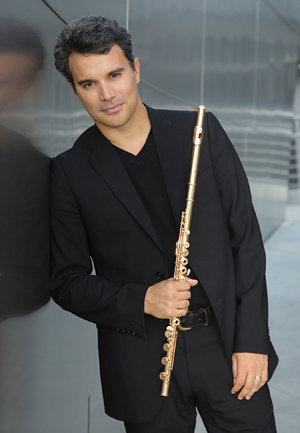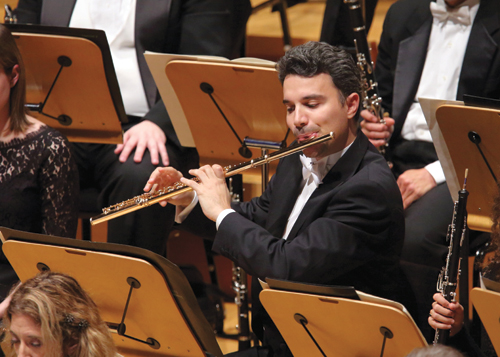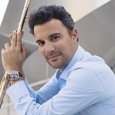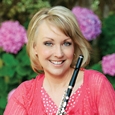 Julien Beaudiment, a noted protégé of the French School of flute playing, recently moved to the United States to join the Los Angeles Philharmonic Orchestra after he was appointed to the position of principal flute in September, 2013.
Julien Beaudiment, a noted protégé of the French School of flute playing, recently moved to the United States to join the Los Angeles Philharmonic Orchestra after he was appointed to the position of principal flute in September, 2013.
The 2013-2014 concert season was one of many notable firsts in Beaudiment’s life. In addition to working as a full-time symphonic musician in the United States and driving a Chevrolet (part of the American Dream in his words), he experienced his first earthquake. It occurred in the middle of a performance of the complete ballet version of Daphnis and Chloe. “I did not quite know what to do as many players just stopped, but there was a flute solo coming up so I continued on. The players who had stopped then followed my lead, joined in and kept on going. I was very afraid.” (Fortunately, the Walt Disney Concert Hall was not damaged in the 5.1 earthquake even though the epicenter was just 20 miles away.)
Julien Beaudiment was born in 1978 near Bordeaux, France. His father is a psychiatrist, and his mom is a retired hospital nurse. Julien is the only musician in the family, and the oldest child of four boys, with brothers Maxence, Charles, and Adrien. Beaudiment became interested in playing the recorder when he was six years old and was a very serious student from the start. His father suggested that he should switch to the flute, as recorder was a little limiting. “The Baroque music was about all we studied on the recorder, so when I went to a flute class, it was love at first sight. There is such a mystique about the flute’s sound, and I could see that I could now perform things I could not do on the recorder.”
His first studies were at the La Rochelle Conservatory, which specialized in orchestral training. He later studied at the Guildhall School of Music in London with Paul Edmund-Davies when he was 18 years old, and two years later finished his studies at the Conservatoire National Superieur de Musique in Paris with Sophie Cherrier. “Each teacher gave me complementary kinds of fresh ideas. Paul’s sound is huge, and he was the first teacher to work on the mechanics of air and blowing with me. He helped me open up my sound. Sophie gave me ways of expressing myself musically. I like to say Paul’s teaching is like the earth, very grounding, and Sophie’s is like the sky, full of possibilities.”
Beaudiment’s first orchestral job was with the Orchestre de l’Opera National de Lyon when he was 22 and still a student at the Conservatoire. It was a challenging first position at times. “The conductor kept a little basket by the podium filled with scraps of paper. Each piece had a musician’s name written on it. Before the first rehearsal, he would pull out a name from the basket, and ask that player to randomly play a passage from the opera at hand. It could be from anywhere in the full score. It really kept us on our toes musically. I was so scared, as we all were, of this solo by lottery system he had for checking up on us.”
The position also had its lighthearted moments. “The World Cup Soccer Championships are always very exciting times in Europe, but the Lyon Opera never stops, not even for France vs. Brazil. One of our colleagues was in charge of checking the scores and updating us in the pit. France scored a goal, and everyone was whispering the score 1-0, and passing it along. I got so excited I forgot a line in Eugene Onegin! I was smiling at the conductor, and he was smiling at me as I think he knew we were all a little bit distracted from game day excitement.”
Move to Los Angeles
Beaudiment’s audition for the Los Angeles Philharmonic Orchestra was quite different from the usual American audition process. “I received a letter from the orchestra in December inviting me to come over and play. They had heard my playing online and liked what I did. I did not know anybody here. I was invited for a week to play for the orchestra, four concerts with the principal conductor Gustavo Dudamel. I was also asked to play excerpts with the orchestra and a full recital. It truly has been the American Dream to get this job.”
For those taking auditions he suggests, “Many students think of an audition as a punishment. For sure, it is not natural to play alone for 30 seconds or so at a time. Think of this as a recital with 20 little pieces, each with its own unique character and sound. Make your own program out of it. You are really being asked to play with a good sound, in tune, and with the correct rhythm and tempo, which is both easy and difficult at the same time. Rampal said that the person who wins an audition is the one that each member of the jury likes a little bit, and that nobody dislikes. Think about all the things that will affect you, such as the temperature on stage, whether you are hungry, and what it is like to play in the silence. It is a job interview, so show all your skills. Waiting to play also has to be part of your preparation plan.”
He has found LA Philharmonic to be very different from his previous experiences in Europe. “The schedule is much more intense in the U.S. than with European orchestras in terms of the sheer hours. When we were on tour with the Lyon opera orchestra, we would play one day on then one day off, just so the singers could get their vocal rest before the next performance. This is not so with a symphony. The LA Phil just got back from a domestic tour, and we had one day off per week. The rehearsal periods are much shorter too, because compared to opera, symphonic music is not quite so complex. It also does not have to deal with staging and sets. I played my first complete Daphnis and Chloe ballet score on one rehearsal. When rehearsals are over here, we stop precisely on time. Even if there are only 15 measures left of the piece, we do not finish. There is a fantastic efficiency to working in America and I love working here.
“In France, I would bring in my students if we needed substitutes so they could get some experience. In Los Angeles there are professional players on a substitute list, and they play with us. It is not as relaxed in America, it is always a little more on the edge. You must be more ready to create. Sometimes this atmosphere is not the best for making music because one almost has to play it more safe, more ‘in the box’. It takes time to take great risk. The challenge is to try and risk in a short amount of time. I find the American brass sound glorious and the best in the world. In many ways the LAPO is more perfect sounding than the Berlin Philharmonic, whereas Berlin can show more of a sense of artistry and risk and freedom.”
Beaudiment believes that the flute and bassoon are the most important instruments in the woodwind section of an orchestra. “I think the high voices are really essential, and I am sorry for the oboe and the clarinet here, but the highest voice is usually leading the key lines (sometimes with the piccolo of course), and the lowest voice is so important for stabilizing the intonation and leading the counterpoint. I have to say I am very privileged here at the LA Phil, as our principal bassoon, Whitney Crocket, is just fantastic. I also think musically that the flute has a rather glamorous and sexy role in the orchestra. Playing works like Daphnis, Le Faune, and Carmen allow us to express a sensual side to making music.”

Performing
Beaudiment’s favorite concert halls are sprinkled throughout the world. “Walt Disney Hall gives us a close feeling with the audience and is so visually beautiful. The exterior is iconic and stunning. I love Symphony Hall in Boston, La Maison Symphonique in Montreal, and Le Theatre des Champs Elysees in Paris. They are wonderful historic halls. Royal Albert Hall in London is a treasure. It was used in the 1956 Alfred Hitchcock film The Man Who Knew Too Much. (I am a huge fan of Hitchcock movies and soundtracks.) The Tokyo Opera Hall has exceptional acoustics. A hall that has a special place in my heart is the Paris Opera Hall because I always wanted to be principal flute of this orchestra when I was young.”
In addition to orchestral work, Julien is passionate about chamber music and has had some very interesting and unusual collaborations. “Chamber music involves fewer people, and they can be people you love. I accompanied the famous dancer/choreographer Regine Chopinot and Benjamin Millepied performing Bach’s Partita all over the world. This is where I learned to be professional. No matter what I did that day, or what I ate, or how I felt, I had to be in the moment at the performance. I was on stage with the dancers, and we would respond to each other. Their posture was so beautiful that I would always stand a little taller when playing. After all, the movements of this piece are rooted in rhythm and dance. The Sarabande is a dance in a slow three, triple meter, so you must show this. I was not playing alone ever on this stage, and I was very responsible for the dancers, in terms of providing them the correct mood, tempo and styles of music.”
Teaching
Beaudiment has held teaching positions at the Conservatoire National Superieur de Musique de Lyon and was artistic deputy at the Haute Ecole de Musique de Lausanne in Switzerland. He has also taught many masterclasses in the US, Europe and Asia (China, Japan, Korea, and Taiwan). He finds teaching exciting because “I can see the light in a student’s eyes, sometimes more than in a colleague.”
Due to the rigorous performance schedule with the LAPO, he has not been teaching as much as he did in France. “I was teaching about 21 hours a week before I arrived in Los Angeles in July. To give what I know about music for me is very interesting. I always remind students that there must be a balance between the music and themselves. I don’t want to see what I can’t hear. In other words, extra movement from players is not necessary. I ask myself sometimes what should I tell students? It’s all about what the composer wants you as a musician to deliver. Sometimes you have to be a teacher, a coach, and a father figure, all at the same time.
“I also think there is an art to receiving a lesson. I don’t enjoy using my energy to wake up a student. Students today have an easier time finding materials to prepare. There are free downloads, YouTube and yet they are not necessarily more prepared because of all of this convenience. It is important to learn all you can about culture in general to be able to bring that to the music as well.” Beaudiment recommends that students read Quantz’s treatise, On Playing the Flute, Stanislavski’s The Actor’s Handbook, biographies about famous composers, and Paul Eluard’s poems. “Students should be curious and look for inspiration from many places.”
“I do not like to make students scared about the future, but I want to make them understand that there is no success without work and passion. I have sacrificed a lot of things to come as far in my career as I have. It is a privilege to get paid to do what I love, but I work like a dog to keep my level, and I have been working like a dog for a long time. It is a highly competitive world, and there are very few jobs to be had. Be as versatile as you can be. Play piccolo, and play it well. Play jazz, improvise, play with dancers; do any of these things if you are passionate about them. Now, as I say this I recognize that I can only play the flute! I am extremely bad at playing piccolo (just ask my colleague Sarah Jackson), and I don’t know how to improvise or play jazz. But perhaps, I was good enough to become a flute player, and I worked very, very hard at that. When all my friends were playing soccer, I stayed home to practice my scales. When I was living in Paris by myself at age 16, I missed my family, but these are the sacrifices made for the goal.
You may sometimes need to put your private life on hold because you have to concentrate on an audition which could be life changing for you. At the same time, you must find balance in your life. As they say, what does not kill you will make you stronger.”

Playing Advice
For tonal shading and coloring, he advises flutists to start “first with the air. If you think about the lips too much, you will not be able to produce as many colors. It has to come from the air. Air is the key to phrasing, not the lips or the fingers. I think of blowing from my eyes in the low register, from my chest in the middle register, and for the high octave, I feel the sound is coming from above my head. I am very connected with my body when I play. There is an interesting exercise to feel the air moving. Perform a long tone while walking forward, and then, play the same tone while walking backwards. You will feel that the air is coming more from above you while you are moving backwards. For projection, I try to focus on what the audience will actually hear and to put my ears in the very last row of Disney Hall. Usually, the LA Phil has a very, very big sound, so all nuances must be obvious and never too subtle. A solo might be marked piano, but I will actually play mezzoforte with a calm vibrato and phrasing that is easy so that the audience will still hear the piano, dolce phrasing. That is one of the secrets of orchestral playing. Our hall flatters the high registers, and I sometimes find I am playing too bright, so I try to darken up the high register as much as I can.”
For technical practice, Beaudiment calls Taffanel and Gaubert exercises the Bible. “I have used these exercises every day for many years. I don’t feel that I have an easy, natural technique, so after years of playing scales like mad, I still face resistance from the fingers. Because of this I decided to see technical challenges through new eyes. I don’t have anything really special for practicing technique, but I have noticed so much of technical skill is wrapped up in the brain. For example, you may sightread something perfectly the first time, and then it falls apart after a few more repetitions. The reason you played perfectly the first time was due to a higher level of concentration and more air. The secret to good technique is thinking and blowing.”
When asked about his daily warm up, Beaudiment shared these thoughts: “I play long tones first forte, then piano, because the standard warm up of Moyse De La Sonorite, where all notes are one dynamic, does not really warm up all the sound. I play scales with very little sound to relax the lips and warm up the fingers. I prepare the difficult passages in the orchestral music further in advance than the pieces that are really good friends, like Brahms Symphony #1 for example, where I can prepare the day before the rehearsal.”
With his many passions for orchestral playing, teaching, and chamber music, Beaudiment feels that the hardest thing in life is to find balance. “It is one thing to have a great job; it is another to know exactly the kinds of things that are good for you and right for you as a person. There are some things I am not willing to do for my career any more at this stage of my life. It is easy to be a good person, and it is also easy to be a difficult person. The key is to have this wisdom beyond the job. Sometimes it takes just one person in an orchestra to make things difficult. There is an art to being a great colleague. I am motivated by the love of music, certainly not just money, and by sharing this music. To improve, to be better 15 years from now, as well as to create what the composer wanted, that is the goal. I want to find the perfect balance and peace between my private and professional lives in the future.”
* * *
French School of Flute Playing
Beaudiment’s style brilliantly represents the French School of flute playing. “The French School is characterized by a sound that is full of color, not forced, and not powerful at all costs. It began after the French Revolution in 1795. François Devienne was one of the first teachers at the conservatory, and woodwind instruments were at the core of this sound revolution. There is clarity of tone, and vibrato is approached in a more relaxed, less mechanical way. It is not taught with x number of pulses per beat. The delicacy of Impressionism, from Debussy to Ravel, also influences the sound, as does the lighter style of French food, as opposed to heavier German fare. There can be an intensity of sound without any vibrato at all, and conversely a player can be very non-musical with vibrato in their sound. Vibrato is a tool for expression. In the 1930s most French flutists sounded similar with a tight throat, which closes off the air stream, and a tighter vibrato. Rampal was one of the first players to come along and perform with a deep, more open and relaxed vibrato and tone quality.”
* * *
Beaudiment’s Favorite Etude Books
Joachim Andersen, Op. 33,63,15, 60
Ernesto Kohler, Op. 33, 66, 75
Sigfrid Karg Elert, 30 Caprices, Op. 107
Theobald Boehm, 24 Caprices, Op. 26
Leonardo de Lorenzo, Op. 34
Paul Jeanjean, Modern Studies
Transcriptions of Violin Works
Niccolò Paganini, 24 Caprices
Henryk Wieniawski, Caprices






